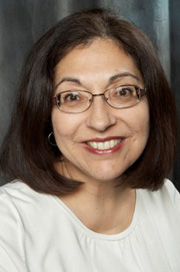Ashley Paterson clearly remembers the first day of one of her classes when all of the students had to say a little about themselves. A boy in the class introduced himself, noted that he was from the Middle East, and added the caveat “And I’m not a terrorist.”
“That’s an example that really highlights the importance of identity,” said Paterson, a PhD student in psychology. “You could see how he was struggling with his cultural identity in a society that so often discriminates against people.”
Paterson knows more than a little about how young Arabs struggle with their cultural identity. Along with academic supervisor Julie Hakim-Larson, she co-authored a paper published last fall in the Journal of Multicultural Counseling and Development that examined issues of acculturation and enculturation among Arab youth in Canada.
According to the previous research she examined, children of first-generation Arab immigrants often struggle between staying true to their parents’ family values and trying to fit in with their Canadian peers.

Julie Hakim Larson. |
“The pressure to maintain Canadian social norms can be associated with inner conflict,” she writes. “Children of Arab immigrants have been described as being in between two worlds; one private that includes their families, and one public that includes their friends and community.”
Paterson’s study included 98 people between 15 and 21 years old and from such countries as Lebanon, Egypt, Iraq and Syria. It aimed to learn more about their acculturation, or how they adopt the dominant culture, and their enculturation, which involves socialization into the values, beliefs and behaviours of one’s culture of origin.
Using three measures, she found that having an Arab orientation relates to family life satisfaction, but was not related to school satisfaction. She said the process of acculturation and enculturation are both important, and both lead to greater life satisfaction, but research shows it can be a challenge for many youth to strike a balance.
“When your cultural values and beliefs don’t necessarily fit with the values and beliefs of mainstream culture, that can create discomfort and tension,” said Paterson, who is originally from Montreal and currently doing her clinical residency in Kingston, working with both children and adults with developmental disabilities.
Her work is just the kind of research that Dr. Hakim-Larson wants to explore in greater depth when she and Dr. Roseanne Menna host a symposium here in May 29 and 30 sponsored by the Society for Research and Child Development, the Social Sciences and Humanities Research Council, Leddy Library and the Department of Psychology. International research partners from the Middle East and across North America will be here to discuss various emotional and psychological issues that Arab youth face.
“We’re trying to identify their issues and their problems and to find ways to help young people progress, not just here, but internationally,” said Hakim-Larson, who recently launched the Immigrant Youth Research Group. “There’s a youth surge in the Middle East and the United Nations has recognized this. There are a lot of refugees coming out of that region and many of them are young people, so addressing their needs becomes a priority.”
.jpg)

